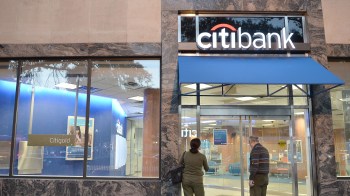The downside to Citibank clearing little checks first
Bob Moon: You may have experienced this: you have a lot of checks and payments going in and coming out of your bank account. Paychecks going in, mortgage and car payments going out — and wires get crossed. Before you know it, some little check to the dry cleaner bounces.
Citibank said today that come July 25th, it’ll clear all those little checks before the big ones. The aim is to reduce the number of bounced checks. But Mike Moebs, an economist with bank consultancy Moebs Services, says there’s a potential downside. Thanks for joining us.
Mike Moebs: You’re welcome, Bob.
Moon: So explain, if you will, what Citibank is doing exactly and how that differs from the way banks have processed checks in the past.
Moebs: Well in the past, Bob, they have processed checks of your largest items, such as rent, mortgage payment, auto payments first. And then smaller items, such as for cash or very small items at a convenience store, gas station, grocery store they have processed last. The difference here is this: You will pay less fees because there will be fewer items that you will be charged for. However, you will also have a lower FICO score.
Moon: The credit score is going to go lower because of what?
Moebs: Since the bigger ones will probably be rejected — and the bigger ones are mortgage and auto payments — they will be reported that you were late on your payment and/or they could be reported, which is even more adverse, that you didn’t have any money in your account and the check bounced.
Moon: So be careful what you wish for here. If they just clear those smaller checks, then I wouldn’t bounce so many. But boy, you’ve got a flip side.
Moebs: Absolutely you do. Those small, independent outfits that the consumer may go to, like a small grocery store, they usually have more leverage with their banks than the consumer has. If the consumer would say to them, “Gee, I made a mistake” to Dave Drugs, Dave would say, “Oh, forget about it. I’ll handle it with the bank. You say that to somebody who has got your auto loan, they don’t care. They’re just going to record the fact that you didn’t make your payment on time. Those will cost you somewhere in the range of 30-70 FICO score or credit score points.
Moon: But if, as you say, consumers are going to be unhappy about this, why would you have the banks do this?
Moebs: Primarily because many consumer advocates lacking the information on researching this have influenced Congress. And some Congressional representatives and senators have felt that this is the way to go, but they don’t realize that if that mortgage payment bounces or auto payment bounces, that’s going to be recorded. And in this day and age, with everything that’s going on in the credit card business and with lending in total also, that’s very significant.
Moon: Be interesting to see how this is received. Banking consultant Mike Moebs, thanks for joining us.
Moebs: You’re welcome.
There’s a lot happening in the world. Through it all, Marketplace is here for you.
You rely on Marketplace to break down the world’s events and tell you how it affects you in a fact-based, approachable way. We rely on your financial support to keep making that possible.
Your donation today powers the independent journalism that you rely on. For just $5/month, you can help sustain Marketplace so we can keep reporting on the things that matter to you.


















